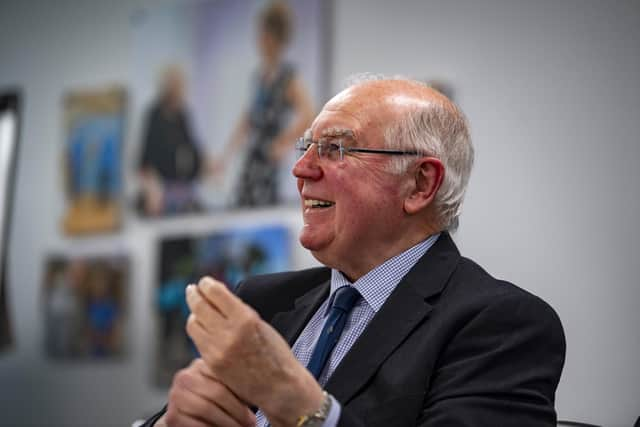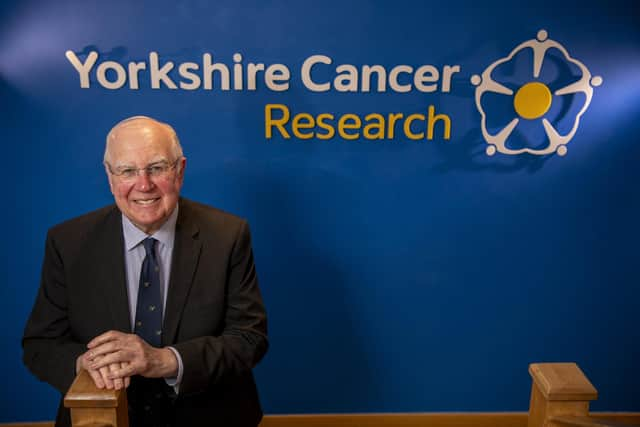How new Yorkshire Cancer Research chair Alan Langlands went from council estate to running the NHS aged 42: “It would be impossible today”
Sir Alan Langlands has just made another addition to an extraordinary CV that already includes running the NHS for much of the 1990s and leading the University of Leeds for the bulk of the 2010s.
The former NHS chief executive and university vice-chancellor, who has a host of honorary doctorates and fellowships to his name along with a knighthood, has been appointed as chair of trustees for Yorkshire Cancer Research for an initial three-year period.
Advertisement
Hide AdAdvertisement
Hide AdAs he sits down with The Yorkshire Post at the charity’s headquarters in Harrogate, Sir Alan explains he was motivated to take the role for both professional and personal reasons.


He has a career-long interest in the scientific basis of health services and how they can be developed and improved through research, and was involved in setting up the NHS R&D programme which is now called the National Institute for Health and Care Research.
Sir Alan has also lost both his mother and sister to cancer - the latter’s funeral happened the day before he was interviewed for the Yorkshire Cancer Research job.
He says his experience is a sadly common one.
“There is that personal link but that isn’t anything special because cancer has probably touched most families at some point ,” he says.
Advertisement
Hide AdAdvertisement
Hide Ad

“My mother died when she was very young in her 50s and my sister, who was older than me, died just a few months ago.”
It will be the latest chapter in an incredible life story for Sir Alan, which began in a three-bedroom council house in Glasgow in the 1950s. His father worked in the carpet factory that made the carpets for the Queen’s coronation, while his mother was looking after her own father after the early death of her mother.
Sir Alan recalls: “There was my uncle and his father in one room, my sister and I in the next room and my mum and dad were in the other room. That is how it was for everyone on the street.”
He attended the Allan Glen School, which had been established in the 19th Century to give a good education to the sons of tradesmen, and its specialism in science led him onto a degree in biological sciences at the University of Glasgow and making the first steps on the path to running the NHS just 20 years after graduating.
Advertisement
Hide AdAdvertisement
Hide AdHe says his rise to one of the most important jobs in Britain would effectively be “impossible” today due to how society has changed.
“In a strange way coming from a council estate in postwar Glasgow wasn’t such a bad place to be for young people in the 1950s and 60s. The schools were great and there was healthcare embedded in the schools, you had easy access to local libraries and wonderful swimming pools.
“Although we weren’t living in a well-off middle class setting, there were youth clubs and football teams and all sorts of stuff going on. It was a very different world.
“By the time you got through school, you didn’t pay to go to university, they gave you a grant.
Advertisement
Hide AdAdvertisement
Hide Ad“Set that against the current generation. The transitions I made were a payback for other people making that investment.
“It would be impossible to do it today. There’s no way we would have even dreamed of paying university fees at that point.
“Everyone’s moved on and it is a completely different society. It was a very different world.”
But he is also measured about the things that have improved - including public health.
Advertisement
Hide AdAdvertisement
Hide Ad“University was a strange experience. We were in the middle stages of my mother’s issues and my dad was not in good shape either. Whilst I paint the positive picture of that period of time, my mother was in her 50s and my dad was quite ill in his early 60s.”
After joining the NHS graduate training programme in 1974, he had stints working at local and regional level in the NHS, predominantly in Edinburgh and London, including The Middlesex and University College Hospitals.
He says the move to London was something of a culture shock.
“You’d got the Iranian Embassy siege, you had AIDS and HIV suddenly arriving in the UK which was a big thing in that part of London, you had the Royal Wedding where you are designated to be looking after Ronald Reagan’s medical records which arrived in a great van with a filing cabinet.”
Advertisement
Hide AdAdvertisement
Hide AdAfter being made NHS deputy chief executive in 1993, just one year later he was given what has often been described as the “toughest job in Britain” and put in charge of running the national NHS at the age of just 42.
The time also coincided with his move to Yorkshire following a Tory Government decision that the NHS officials should be based in Leeds rather than London.
Sir Alan admits he initially planned to stay in London but decided he had to come up North after being put on the spot by staff.
“Hundreds of people moved from London to Leeds at the time. That was quite a difficult move and I must admit I had no intention of moving but it was almost impossible to convince hundreds of other people to do it.
Advertisement
Hide AdAdvertisement
Hide Ad“I was put in an impossible position. I was standing in a hall in Westminster telling hundreds of people their lives are going to be changed beyond recognition, extolling the virtues of schools in Yorkshire, telling them what a wonderful place it would be, showing them how much better the house prices were. There was complete silence and one young woman in the front popped her hand up and said, ‘I’ve only got one question, are you coming to?’
“I replied, ‘Of course I’m coming, it is going to be great’. So I then had to go back home and explain what was happening.
“The first weekend we came up here to look for a house, my kids who were 13 and 15 wouldn’t get out of the car. The very interesting thing is they are now in their early 40s and having lived in Edinburgh and London and various other places, they have both moved to Yorkshire.
“In a sense, you could say Yorkshire was more like Scotland. London was total pressure and a rat race. It was a bit different and a bit of a relief.
Advertisement
Hide AdAdvertisement
Hide Ad“After the 1997 election, I was sitting with Blair and we cleared that I was going to stay in post which made me feel better. But he said to me, ‘What’s all this Leeds stuff?’ I said that is our relatively new headquarters and he said ‘I want you here’.
“I said, ‘I’m not mainly in Leeds either, we are running the National Health Service, I’m in Plymouth, I’m in Newcastle, I’m in Edinburgh’. He said it would be better to be based in London so I spent all my time back and forth on the train.”
He says he was particularly proud to receive a knighthood in 1998 to coincide with the 50th anniversary of the NHS. But all was far from perfect within the health service.
“The NHS was in crisis then as well. The word wasn’t used as often as it is now but we knew quite well about winter pressures even then. In my last period, 1998 and 1999 weren’t easy because Labour had taken the view they had to be prudent and were holding onto the Tory spending plans which meant not much of a spending increase for the NHS.
Advertisement
Hide AdAdvertisement
Hide Ad“We had to bit by bit extract money from the Government. The money really came on-stream after I left but I was involved in the negotiations that got it. We had some quite tough times. There were distractions like the Millennium Bug where everyone thought all the hospitals across the country would go dark at midnight, machines would go off and everything would break down. Obviously it didn’t happen.”
Sir Alan resigned in 2000 to the surprise of many observers.
“It was my choice to go, which is not always the case in that job. I just thought I had probably done most of what I could do. I was only 48 so had to find something else to do.
“Universities were the obvious place to me. I went to Dundee University, which was a biological sciences university and has one of the best set-ups in Europe.”
Advertisement
Hide AdAdvertisement
Hide AdIn 2009, he became chief executive of the Higher Education Funding Council for England and then in 2013, took up the post of vice-chancellor of the University of Leeds. He stepped down in 2020 and says it was a job he particularly treasured.
“At one point we were voted the University of the Year which was a big thing at the time. Leeds was a very impressive research-intensive university when I got there but it got better in terms of research funding, we attracted a lot of people.
“When you go to work in Leeds you walk into the middle of a population of 38,000 students and 8,000 members of staff on the campus and they are all doing these fantastic things.
“It was the only job I had where I learnt something new every day.”
Advertisement
Hide AdAdvertisement
Hide AdNow 70 years old, Sir Alan says he is looking forward to his latest challenge at Yorkshire Cancer Research where he is taking over as chair of trustees from Graham Berville, who he praises for playing his part in creating a strong organisation.
“The previous chair was fantastic - they say you should always pick your predecessor carefully. The thing that attracts me to this place is the ethos. If you say ‘cancer research’ some people would put an elitist label on that and I think Yorkshire Cancer Research is the complete opposite. It is friendly, approachable, honest and straight-forward. That is how people here do their work in a way that engages the clinical community. Without donors and fundraisers and local community groups who support Yorkshire Cancer Research, none of this fancy science stuff would be possible.”
Among the work he is particularly excited about is an ongoing research programme at Sheffield Hallam called Active Together assessing whether exercise can improve the effectiveness of cancer research. Sir Alan says: “If I were trying to distil into action what we are trying to do here, we have got about 60 research programmes running but you can begin to group them. The actions are about preventing cancer, about diagnosing cancer early which is a huge thing and then finally treating cancer. We have 750 experts and a quarter of a million people involved in programmes. That is exciting.”
What Sir Alan thinks of the NHS’s current state: Read Monday’s Yorkshire Post